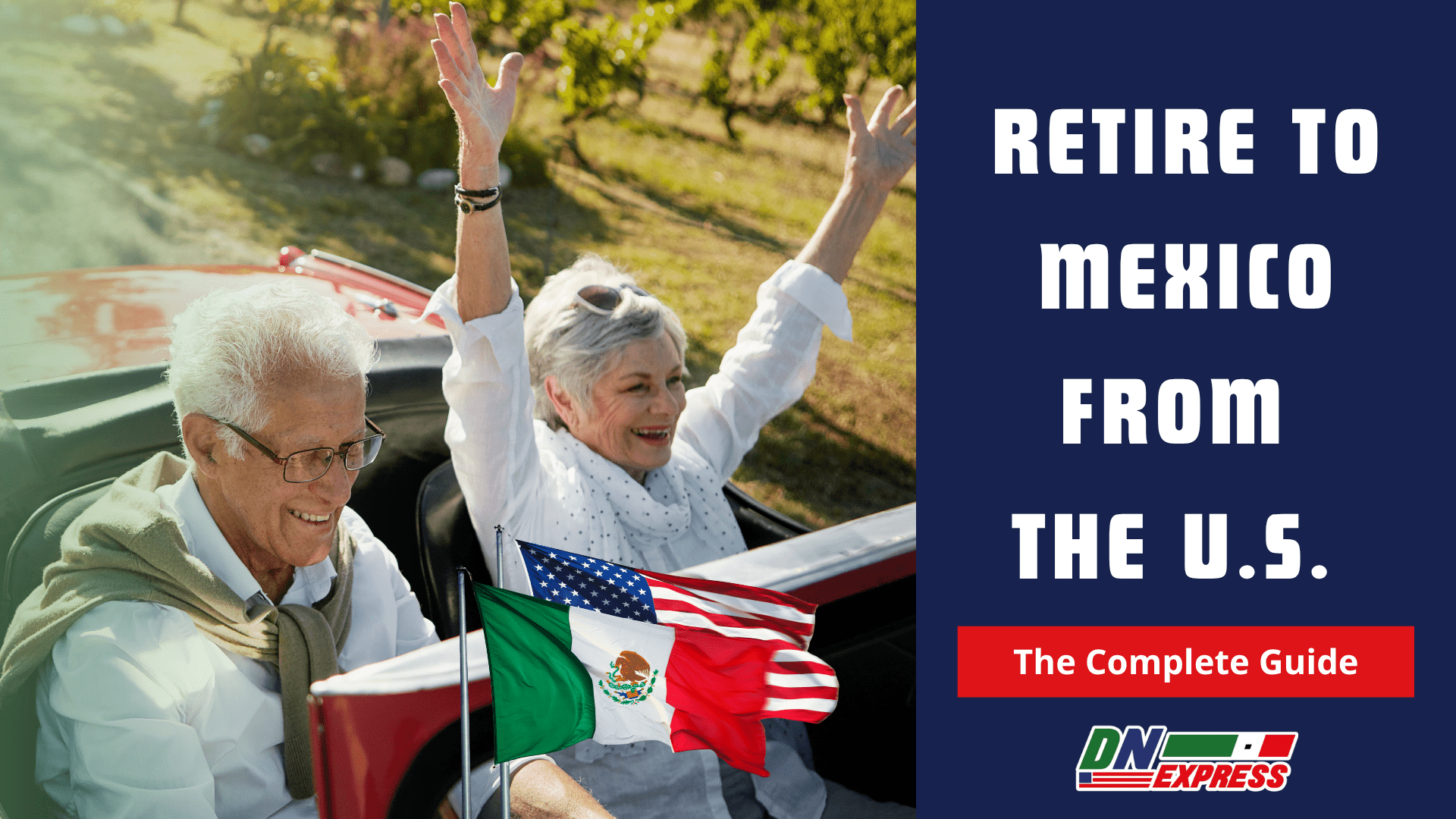
Retiring to Mexico from the U.S. offers lower costs, better quality of life, and access to public healthcare, if you do it right. Learn the real financial requirements, residency options, and how to avoid legal headaches by securing dual citizenship or permanent residency.
Whether you're retiring for financial freedom, family heritage, or better healthcare, Mexico offers a practical and often more fulfilling lifestyle than the U.S., but only if you grasp the legal paths.
Some need a temporary or permanent visa; others can qualify for Mexican citizenship and skip the bureaucracy altogether.
If you have Mexican parents or grandparents, you may be eligible for Mexican citizenship by descent, no income proof required. If not, there are still pathways through financial residency, marriage, or dual legal strategies that can work in your favor.
Either way, we help you get it done without navigating the consulate maze alone.
Want to know which path is right for you, what it costs, and where Americans actually retire in Mexico? We'll break it all down for you next.
Is Retiring to Mexico Worth It in 2025?
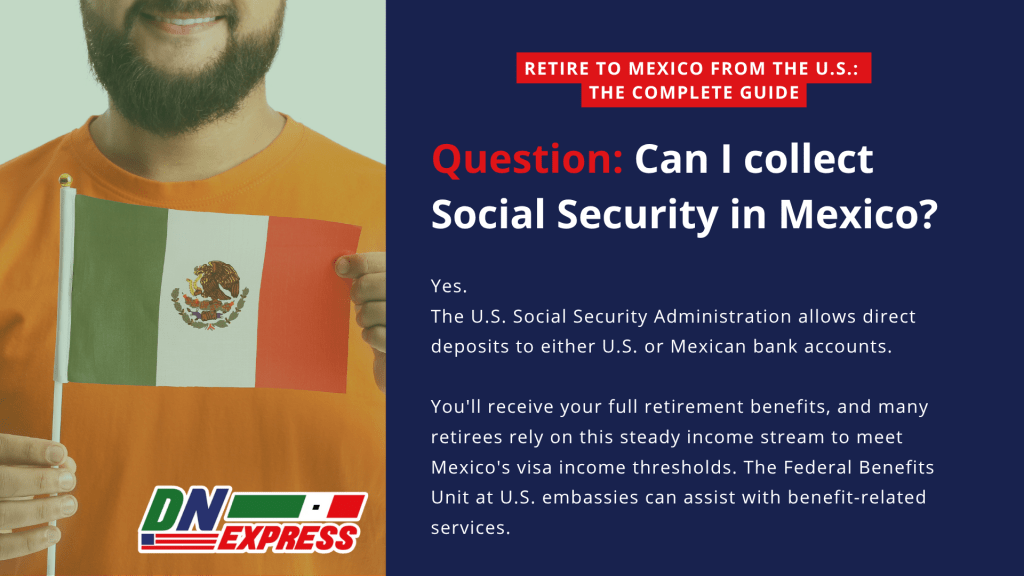
For many Americans, the answer is a clear yes if you grasp the system.
Mexico offers a lifestyle upgrade that's hard to ignore: your dollars go further, healthcare is affordable and accessible, and the pace of life is more relaxed. A modest retirement budget of $2,500–$3,000 a month can cover rent, healthcare, groceries, and even part-time help in many Mexican cities.
But it's not all palm trees and margaritas.
Retirees often run into confusing visa rules, unpredictable consular requirements, and cultural differences that aren't always easy to adapt to. Coastal areas, while scenic, come with hurricane risks and rising property prices.
Rural zones may lack infrastructure like high-speed internet or hospitals. And emotionally, living far from adult children and grandchildren takes its toll.
Still, thousands are making the move each year, some for the warmth, others for the roots. If you're strategic about where you live, how you get legal status, and what lifestyle you want to maintain, Mexico can be not only worth it, but the best move of your retirement life.
In the next section, we'll help you figure out which path fits your situation best.
What Type of Retiree Are You?
Every retiree has different goals, legal options, and emotional ties when considering a move to Mexico. Here's how your path might differ depending on your background and priorities:
Reclaiming Heritage
If one or both of your parents or even grandparents were born in Mexico, you may be eligible for Mexican citizenship by descent, no financial requirements, no residency quotas, no need to “earn” your way in.
This is beyond a legal shortcut; it's a powerful emotional reconnection to your heritage.
As a Mexican citizen, you can skip the fideicomiso (bank trust) needed by foreigners to own coastal land, enroll in national healthcare programs, and pass citizenship down to your children. We've helped countless clients who thought they were ineligible due to name mismatches or missing documents, only to reclaim their nationality with a few strategic fixes.
Retirement or Relocation
If you're not of Mexican descent, you'll likely need to apply for a temporary or permanent resident visa.
These require financial proof: generally around $3,000/month in income or $53,000+ in savings, though exact thresholds vary by consulate.
Permanent residency offers long-term peace of mind but doesn't come with full citizenship rights like land ownership in restricted zones or passing benefits to children. It's a solid option for those ready to retire full-time in Mexico without Mexican lineage.
Benefits for Children
Many retirees don't only want citizenship for themselves, they want it for their children, too.
Dual nationality for U.S.-born children of Mexican heritage means access to public schools, healthcare, college tuition discounts, and cultural belonging.
It's also a powerful way to open doors for the next generation. If your children are under 18, they may qualify as dependents on your residency through marriage or citizenship process, and that can dramatically simplify the path for your entire family.
Avoiding Bureaucracy
We hear it constantly: “I tried the consulate three times and gave up.” The process can be inconsistent, confusing, and deeply frustrating.
That's why many retirees are choosing remote, attorney-led services like Doble Nacionalidad Express.
No consulate visits. No 12-month waits. No being told “you're missing one document” after flying across the country.
We handle the process from start to finish, securely, legally, and without surprises.
Legal & Economic Protection
For those thinking long-term, estate planning, property, taxes, and healthcare, Mexican citizenship offers key protections.
You'll gain access to IMSS or INSABI (Mexico's public healthcare systems), the right to own land anywhere, and legal residency for your heirs.
Citizenship also opens the door to dual tax strategies under the U.S.-Mexico tax treaty and smooths out retirement benefits, business ventures, and cross-border banking. In short: it's not only a passport, it's a safeguard.
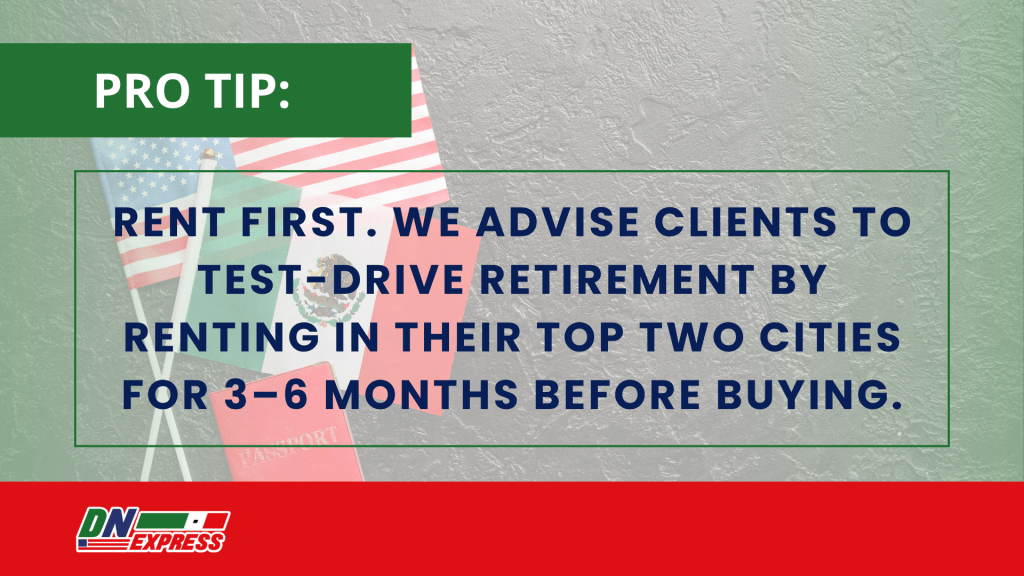
What You Need to Know Before Moving
Before you pack up and buy a one-way ticket, it's necessary to know what retirement in Mexico actually requires, legally, financially, and logistically.
Financial Requirements for Residency
- How much money do you need to retire in Mexico?
Most U.S. retirees qualify for Mexican residency through one of two financial routes:
- Around $3,000 USD per month in consistent after-tax income (pension, Social Security, annuities, etc.), or
- A savings/investment balance of about $53,000+ USD over the past 12 months.
These requirements are tied to Mexico City's minimum wage and can increase yearly. Each Mexican consulate sets slightly different thresholds, so check with the one nearest you or consult a legal service like ours to get the exact 2025 financial requirements.
- Can I retire in Mexico with $3,000 a month?
Absolutely. $3,000/month is sufficient for a comfortable, middle-class lifestyle in most Mexican cities.
You can afford:
- A 2-bedroom apartment or small house in a safe area
- Weekly meals out, housecleaning, and groceries
- Private healthcare or insurance
- Travel and entertainment
Be aware that living in places like San Miguel de Allende or Puerto Vallarta may push costs higher, especially near tourist zones. Rural towns or mid-sized cities like Mérida or Querétaro offer better value for your budget.
Taxes, Retirement Benefits & Cost of Living
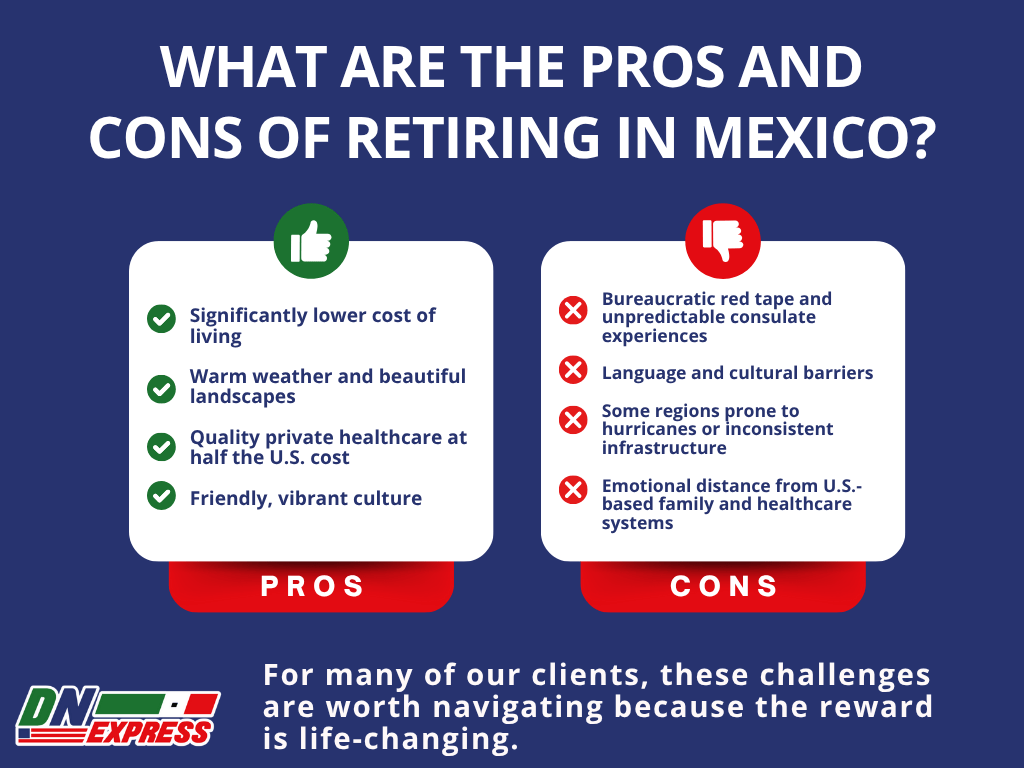
- Can I collect Social Security in Mexico?
Yes. The U.S. Social Security Administration allows direct deposits to either U.S. or Mexican bank accounts.
You'll receive your full retirement benefits, and many retirees rely on this steady income stream to meet Mexico's visa income thresholds. The Federal Benefits Unit at U.S. embassies can assist with benefit-related services.
- Do I pay U.S. taxes while living in Mexico?
Yes. As a U.S. citizen, you must still file taxes annually on your worldwide income, even if you live abroad full time.
The good news? You may qualify for the Foreign Earned Income Exclusion, tax credits, or benefits under the U.S.-Mexico Social Security Agreement, which helps avoid double taxation.
- How long can I live on $100,000 in Mexico?
Depending on location and lifestyle, $100,000 could last you 3 to 6 years.
In rural cities or small towns, that budget can stretch dramatically. In beach towns or expat-heavy enclaves, it goes faster due to rising rents and imported goods.
- What are the pros and cons of retiring in Mexico?
Pros:
- Significantly lower cost of living
- Warm weather and beautiful landscapes
- Quality private healthcare at half the U.S. cost
- Friendly, vibrant culture
Cons:
- Bureaucratic red tape and unpredictable consulate experiences
- Language and cultural barriers
- Some regions prone to hurricanes or inconsistent infrastructure
- Emotional distance from U.S.-based family and healthcare systems
That said, many of these “cons” are avoidable with smart planning and the right legal support.
In the next section, we'll explore which cities give you the safest, most enjoyable retirement experience, and how to test-drive your new life before committing long-term.
Choosing the Right Place to Retire
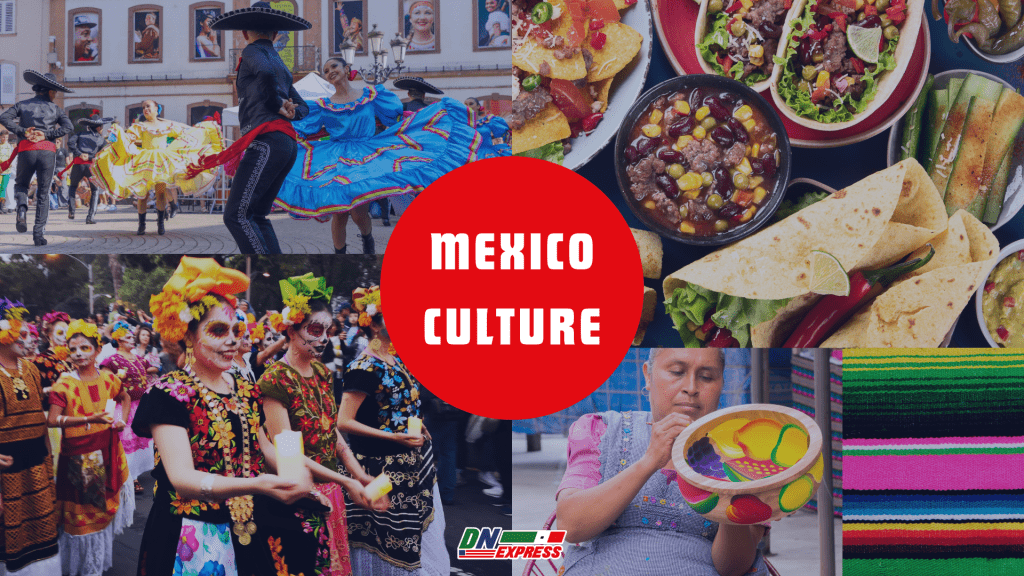
Location is everything, especially in retirement. The best place for you depends on your lifestyle, health needs, climate preferences, and budget.
Fortunately, Mexico offers a wide range of options, from modern cities to coastal hideaways to quiet pueblos with deep cultural roots.
Where Do Most Americans Retire in Mexico?
The top retirement spots tend to check three boxes: affordability, safety, and expat support. Among the most popular are:
- Lake Chapala: The largest expat community in Mexico, known for its temperate climate, English-speaking services, and relaxed pace of life.
- San Miguel de Allende: A UNESCO World Heritage city with a rich arts scene, cobblestone streets, and colonial charm.
- Mérida: Often ranked one of the safest cities in all of Mexico, Mérida offers healthcare access, low crime, and cultural depth.
- Puerto Vallarta: A coastal gem with beaches, vibrant nightlife, and excellent infrastructure, though it can be pricier.
What's the safest place to retire in Mexico?
Safety is a major concern for retirees, and rightly so. Mérida (in Yucatán) and San Miguel de Allende (in Guanajuato) consistently top the charts for low crime, stable infrastructure, and peaceful living according to U.S. State Department travel advisories.
Both have strong expat networks, reliable hospitals, and walkable city centers.
Climate and Lifestyle Fit
Not everyone wants beach life year-round. Coastal areas like Mazatlán, Cancún, and Puerto Escondido may offer sun and surf, but they come with:
- High humidity
- Hurricane season risks
- Rising property prices
In contrast, central Mexico offers spring-like weather year-round. Cities like Querétaro, Puebla, and Guanajuato sit at high elevations, giving you cool mornings, warm days, and lower air conditioning bills.
City vs. rural?
Here's where it gets personal. If you thrive on culture, hospitals, and amenities, larger cities like Guadalajara or Mexico City might be right.
But if you're seeking peace, lower costs, and a slower pace, towns like Pátzcuaro or Ajijic may feel like home.
Legal Options: Residency vs. Citizenship
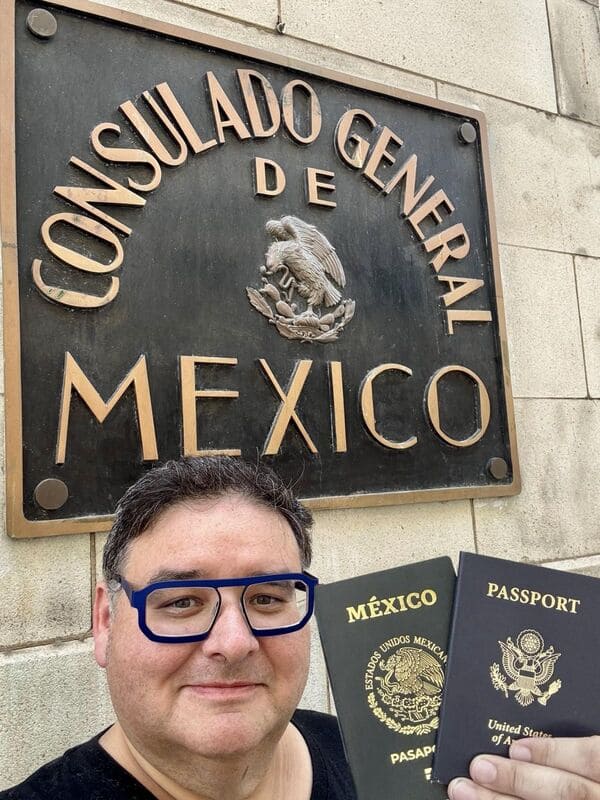
Before you move, you'll need to decide how you plan to live in Mexico legally, through residency or citizenship. Both have pros and cons, but one path offers a much smoother road if you qualify.
The Best Way to Retire in Mexico
If you're eligible for Mexican citizenship by descent, you're in a uniquely privileged position.
Whether your parent or grandparent was born in Mexico, this heritage unlocks a streamlined path to full citizenship with no income requirements, no residency minimums, and no renewals.
Here's why this path is considered the golden ticket:
- No financial thresholds to meet, unlike visas tied to monthly income or savings.
- No annual renewals or immigration appointments, ever.
- Full access to public healthcare systems (like IMSS o IMSS-Bienestar).
- Legal ability to own land anywhere in Mexico, including coastal zones without needing a fideicomiso (bank trust).
- The right to vote, pass down citizenship to your children, and access public services as a national.
Citizenship also protects you from future policy shifts in immigration law, something that's increasingly valuable for long-term planning and property ownership.
What Are the Downsides of Doing It Alone?
Many retirees try to navigate the process solo, whether it's a residency application through a consulate or a citizenship claim through ancestry. Unfortunately, this often leads to:
- Rejection due to small paperwork errors, outdated forms, or missing documents.
- Overwhelm from confusing legal terms, differing consular interpretations, and shifting policies.
- Long delays, especially when trying to book appointments at overburdened Mexican consulates, some retirees wait over a year for an interview.
Even one mistake, like a mismatched name on your parent's birth certificate, can derail your case. That's where legal support becomes necessary.
We solve these problems by working remotely with licensed attorneys in Mexico.
No consulate visits, no guesswork, and no waiting on a broken system.
Whether you're applying for citizenship or correcting old documents, we take care of it while you focus on planning your next chapter.
Up next, we'll share how we've helped families like yours, and how you can start your journey with zero legal stress.
How to Start Your Retirement Journey: Quick Checklist
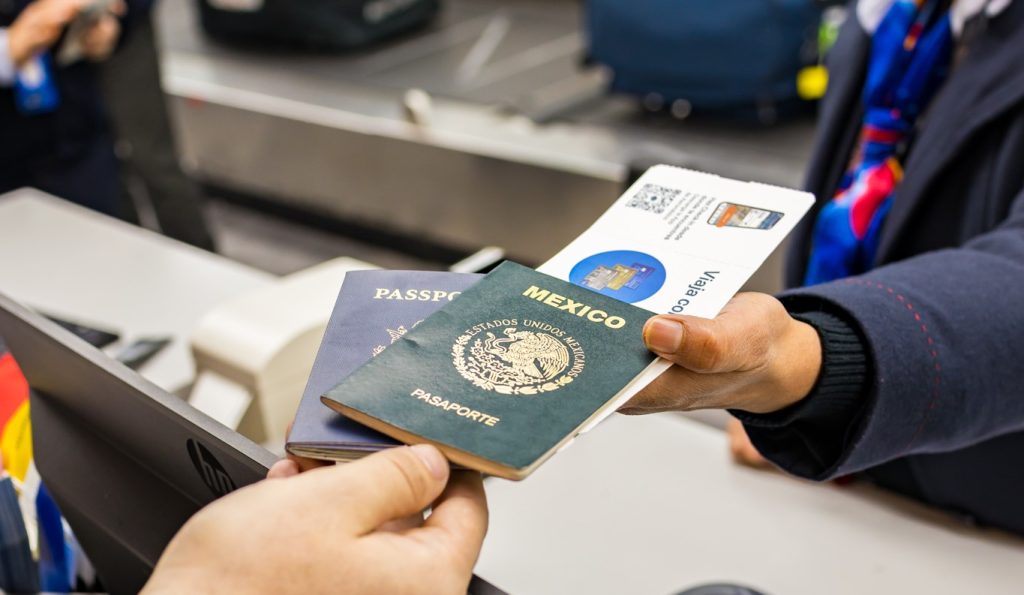
Ready to take the leap, or at least test the waters? Here's how to move forward with clarity and confidence using our comprehensive moving guide:
✅ Confirm if you qualify through ancestry
If your parent or grandparent was born in Mexico, you may be eligible for full citizenship. This is the most secure and cost-effective path, no income requirements, no immigration renewals.
We'll help you verify eligibility and fix any document issues that might be blocking your case.
✅ Get your financial documents ready
If you're applying for a retirement visa instead, gather proof of income or savings. Think bank statements, pension records, or Social Security award letters.
Requirements vary slightly depending on your consulate or attorney's filing method. You'll also need your CURP number for accessing Mexican services.
✅ Choose a city to test for 30–90 days
Before you buy property or make a permanent move, spend a few months living in your top-choice city. Mérida, San Miguel, and Lake Chapala are great places to start, but every region has its own rhythm and cost of living.
✅ Talk to a licensed attorney for legal options
Don't navigate this alone. Our team can evaluate your case, walk you through your best legal path, and file everything remotely.
We've helped thousands of families retire with peace of mind, without setting foot in a consulate. You can also contact our legal team directly for personalized assistance.
Why Work With Doble Nacionalidad Express?

There's a reason so many retirees trust us to guide them through this life-changing transition.
We don't only process paperwork, we solve legal problems, preserve heritage, and restore peace of mind.
Trusted, Licensed Mexican Attorneys
Unlike online services that only fill out forms or sell one-size-fits-all packages, DNExpress is a binational legal team.
Our attorneys are licensed in both Mexico and the U.S., giving us the insight to navigate both legal systems, something most “expat services” simply can't offer.
We know that this goes beyond logistics. It's about reclaiming your nationality, protecting your retirement, and making sure your legal identity is recognized on both sides of the border.
No Consulate Visits. Ever.
Yes, really. We complete the entire process remotely.
No standing in line at 6 a.m. No fighting for appointments that open once a month. No begging your elderly parent to appear in person.
We've built our entire model around making Mexican citizenship and residency accessible, without consulate chaos. If you've been told “you don't qualify,” or hit a wall trying to do it yourself, let us take it from here.
Fast, Secure, and Affordable
We've handled hundreds of successful applications, including cases with:
- Missing birth records
- Name mismatches
- Multiple rejections
- Complicated family histories
We operate with transparent, flat-fee pricing, and our bilingual support team is available every step of the way. We're fast, secure, and obsessively committed to accuracy, because your legal identity deserves nothing less.
Our typical citizenship processing times range from a few weeks to several months, depending on case complexity.
Proven Results, Satisfied Families
“I thought my case was hopeless, but they fixed my documents and I got citizenship without ever going to the consulate.” LA Client, 2024
We've worked with retirees from Los Angeles, Chicago, Texas, and beyond, people who were told it was too late, too confusing, or too expensive. They now own property in Mexico, receive healthcare through national programs, and pass on dual citizenship to their kids.
And we'd be honored to do the same for you.
Ready to Retire in Mexico the Right Way?
📅 Schedule a Free Case Review o Message Us on WhatsApp
We'll let you know if you qualify, fix your documents, and help you secure Mexican citizenship or legal residency, without the stress, the consulate, or the confusion.
Your next chapter doesn't have to wait.
Frequently Asked Questions About Retiring to Mexico from the U.S.
Can a U.S. citizen retire in Mexico permanently?
Yes.
U.S. citizens can retire in Mexico by securing either a temporary or permanent resident visa.
If you have Mexican heritage, you may qualify for full citizenship, which offers even better benefits and long-term stability.
How much income do I need to retire in Mexico?
To qualify for legal residency, most consulates require about $3,000 USD/month in consistent income or $53,000+ USD in savings.
These numbers may vary slightly by location and annually increase with Mexico's minimum wage.
Do I have to pay U.S. taxes if I live in Mexico?
Yes. As a U.S. citizen, you must still report and pay taxes on your worldwide income.
However, you may qualify for tax credits or exclusions under the U.S.-Mexico tax treaty, which helps reduce or avoid double taxation.
Can I get Social Security in Mexico?
Absolutely.
The Social Security Administration allows direct deposits to both Mexican and U.S. bank accounts.
Your benefits will continue as usual, regardless of where you live.
Is it cheaper to live in Mexico than in the U.S.?
Yes, significantly. Retirees report cost savings on rent, healthcare, groceries, and services, often 30–60% less than in major U.S. cities.
What's the best city in Mexico for U.S. retirees?
Top picks include Lake Chapala, Mérida, San Miguel de Allende, and Puerto Vallarta. Mérida is considered the safest, while Lake Chapala offers the largest expat community.
Can I get dual citizenship if my Mexican parent is deceased?
Yes.
As long as you have proper documentation proving lineage (like their birth certificate), you may still qualify for Mexican citizenship by descent, even if your parent is no longer alive.
Do I need to speak Spanish to retire in Mexico?
Not necessarily. In popular expat towns, many locals speak English.
However, learning basic Spanish will improve your integration and daily life experience.
What if I was rejected at the consulate?
You still have options. Many people are told they don't qualify due to documentation issues that can be resolved.
Our service specializes in fixing these cases and completing the process without the consulate.



